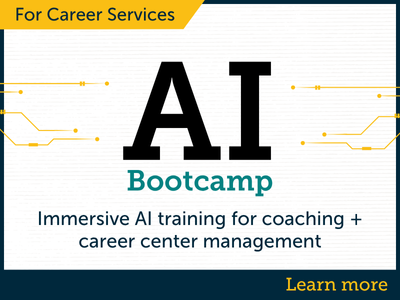There has been amazing adoption and use of AI in career services just in the 18 months since ChatGPT came out, observes Jeremy Schifeling, founder of The Job Insiders.
“Just like the seven stages of grief, it feels like career services professionals needed time to process this change,” Schifeling says.

Master AI for Career Center Management
Join one of our AI Bootcamp sessions—led by Jeremy Schifeling—this fall or next spring. Find new ways to use AI, and boost your advising game this school year. Get live, step-by-step walk-throughs of various AI apps, and practice in small groups each week for four weeks.Learn How to Leverage AI
“The first stage was all about fear of the unknown—'Will these tools take my job?’ But since it’s become clear that this is not the case, that fear has turned into curiosity, and I’m starting to see more and more career leaders getting excited about leveraging these tools for both their students’ and their own success.”
He suggests that, although there are a host of AI vendors on the market already, it behooves career professionals to start with the foundational tools, such as ChatGPT, Copilot, and Gemini.
“That way,” Schifeling explains, “you get really comfortable with how large language models work before you start recommending any more career-specific platforms to your students. Plus, all of these foundational tools are free and easy to start playing around with, so there's nothing standing in the way of your learning.”
He says that when advising students about their use of AI in their job search, there are some key messages the career center should consider delivering to them, including: “We want you to use these tools,” “We want you to use these tools right,” and “We want you to use these tools with us.”
In addition, Schifeling offers several recommendations for career centers looking to implement AI into their operations to enhance their work and support their students:
- Don’t feel like you have to become a prompt engineer or get a second master's degree in AI—Because AI tools are all operated with plain English, there's no need to put them on a pedestal like learning a new software language. Instead, just start trying them out today and you'll learn incredibly quickly. Just get started!
- Recognize that AI is being used by your students whether you are or not—It’s better to dive into the AI world and master it than allow your students to use it willy-nilly and get poor outcomes.
- Find something specific where AI can help—For instance, if a liberal arts student is struggling to find the right path, ask ChatGPT to generate 10 career paths for an art history major interested in sustainability. Or, if you have to deliver a big resume workshop, ask AI to generate three interactive activities that could make the session more engaging.
- Once you're really cooking with AI, start to teach it to your students—The truest test of mastery is whether you can share your expertise with others, so start incorporating it into your 1:1 sessions or even your presentations since that will force you to get crystal clear about the best techniques and strategies.
“While AI can definitely help with lots of student job-searching challenges—from career exploration to interview prep—it can also be incredibly helpful for the day-to-day operation of your center,” Schifeling points out.
“Whether you're generating copy for your weekly newsletter or analyzing student outcome data at the end of the year, AI can take the drudgery out of many of the other things you need to do beyond coaching.”






